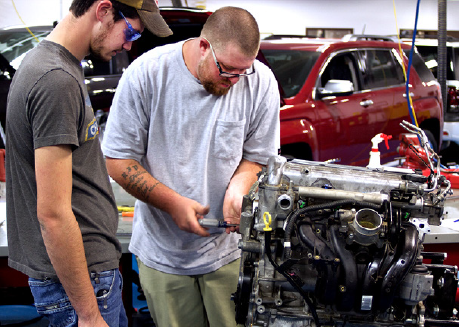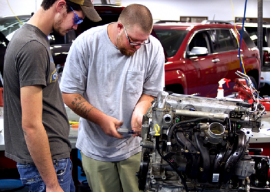Automotive students getting hands-on experience


Those who venture off to the southeast corner of campus will find four new vehicles and 10 engines in the automotive technology lab that were donated over the summer.
General Motors provided the donation, which saved the school an estimated $200,000, said Brad Walker, professor of automotive technology and the department chair at OCCC.
The collection is comprised of two 2014 Chevy trucks, a 2015 GMC Terrain SUV, and a 2015 Yukon SUV, along with 10 four-cylinder engines, Walker said.
General Motors is a partner with the college’s Automotive Service Educational Program, or ASEP.
Automotive technician students already have gotten their hands on the donated vehicles, Walker said.
The biggest benefit of having these vehicles is that the students get to work on the newest technology available, Walker said.
“You get to see the latest and greatest stuff that’s out there, all the new technology,” Walker said.
He said all the donated vehicles come “fully-loaded” with the most up-to-date features, such as a GPS-based navigation system, a crash avoidance system that detects an imminent crash and provides a warning or takes action autonomously, and a lane departure system that warns the driver when the vehicle begins to move out of its lane.
Without the vehicles, the school would not have been able to buy new ones and the students would still be working on the older models, Walker said.
The engines the students had been working on were about eight years old and had been taken apart and put back together anywhere from 25 to 40 times, so they are worn down, Walker said.
He said General Motors has made donations in the past because OCCC trains GM technicians through ASEP.
Twenty out of the 25 vehicles that the school owns are from GM.
In return for donating, General Motors will benefit from having capable, well-educated, and up-to-date technicians working for them.
“ASEP students at OCCC work for General Motors dealers while earning their GM certifications in all eight basic automotive areas,” Walker said. “Then they get their Applied Science degree.”
Christina Atencio, employment and graduation coordinator, said in spring 2015, OCCC had 12 graduates total from the AAS Automotive-Internship, AAS Automotive-GM, and the Certificate in Automotive Technology.
The technician students are working 40 hours a week at their GM dealers and attending classes all day for two days out of the week, Walker said.
“So it makes a very busy two years, but it’s doable,” he said.
Gary Beebe graduated this spring and received the President’s Award for Excellence, a top academic honor. He works for Wade Higgins in Purcell, the GM dealer he worked for while in school.
Beebe said the hands-on training and all the friends he made are what he liked about the ASEP program at OCCC.
Walker said it is important for a mechanic to be knowledgeable and efficient with the many technological advancements.
Some of today’s cars can practically drive themselves, Walker said.
“To work on them, you’re needing a little higher degree of a person, someone who can think outside the box.
“Having an associate’s degree would increase your job opportunities, it would increase your earning potential.”
Beebe concurred.
“Having an associate degree makes finding a job easier,” Beebe said.“It puts you at the front.”
Making anywhere from $30,000 to $50,000 a year, auto technicians are not paid hourly, but by each job they do, Walker said.
“It all depends on how efficient they are and making sure the vehicles are fixed right the first time,” he said.
For more information about the automotive technology program, email Brad Walker bwalker@occc.edu.